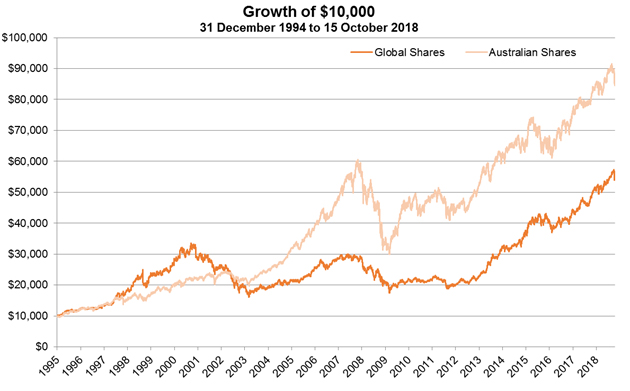What does the recent market volatility mean for investors?
Portfolio Specialist John Owen discusses what’s causing the current market volatility and how MLC is managing their portfolios for customers
What’s causing the market volatility?
There are a number of factors worth noting. Very low interest rates and central banks injecting cash into economies has contributed significantly to the strong market returns we’ve seen in recent years. However, for some time central banks have been either suspending or winding back their stimulus programs. One way of winding back stimulus is by raising interest rates again – the US Federal Reserve has lifted interest rates eight times over the past three years.
It has been an ongoing concern for us that when this artificial stimulus comes to an end, markets would suffer.
Also playing into sentiment is uncertainty created by President Trump’s trade war and the impact on global economic growth, particularly China’s growth. Lending (credit) growth around the world is also showing signs of weakness.
Even though global growth continues and the US economy remains strong, there are fears the company earnings cycle may have peaked and company profitability from here could be under pressure.
The Australian share market has felt the brunt of the recent falls. The weakness of the big 4 banks in the wake of revelations at the Hayne Royal Commission hasn’t helped.
It’s highly uncertain how all these factors will affect financial markets and the economy over the next few years; and this uncertainty has contributed to the share price volatility in recent days.
Putting the market weakness into some perspective, at the time of writing the S&P 500 Index, after falling 5% so far this month, is now back at the level it was early in July.
You may also recall we experienced a significant bout of share market weakness in February this year, only to have the market recover over following months.
How does the recent market volatility impact the funds I invest in?
If your funds are invested in shares, movements in the value of share markets will affect your investment value.
Share markets have risen strongly in recent years, helping deliver solid returns to investors. For example, the Australian share market (measured by the S&P/ASX200 Accumulation Index) returned 11.3% pa in the seven years to 30 September 2018 while the global share market return (measured by the MSCI All Countries World Index, hedged to Australian dollars) was 15.4% pa in the same period. It’s quite normal for share markets to ease back after a period of such substantial growth.
In all periods of volatility, markets act irrationally and our active managers are doing exactly what we expect of them, looking to take advantage and buy good investments at cheaper prices than they could prior to the volatility, which helps lay the foundations for long-term growth.
If possible, you should continue to focus on how you’re progressing towards your longer-term goals. If you were invested during the period of strong returns in recent years you may be pleased with your longer-term returns despite the recent volatility. It’s also realistic to expect that often investments that produce higher returns and growth in value over long periods tend to be more volatile in the short term.
Should I be selling my investments now?
While market downturns are generally unpleasant, they are to be expected as uncertainty will never disappear from investment markets.
As you can see in the following chart, Australian and global share markets have eventually bounced back from numerous down times, including the GFC in 2008. Clearly there’s truth in the adage: “Stocks take an escalator up, and an elevator down” – gradually rising over many months and years but only take a few days to fall.
By selling your investments immediately after a significant fall you’re not only taking losses, you’re reducing your chances of making your money back should markets recover.
The reality of investing in share markets is that we need to accept some risk when seeking returns that will outpace inflation in the long run.

Source: FactSet, Global Shares (unhedged): MSCI All Countries World (Gross, $A) Index, Australian Shares: S&P/ASX 200 Total Return Index. Returns are total returns with dividends reinvested. Past performance is not a reliable indicator of future performance.
I’m retired or close to retirement, what should I do?
It’s not always easy to ignore what’s happening to your investments when there is negative news and markets are volatile. While history has shown us the share market does bounce back, it may be swift or it may take years.
If possible, you should continue to focus on how you’re progressing towards your longer-term goals. However, if the recent market volatility has unsettled you to the point where you would prefer to reduce your exposure to riskier assets or protect some or all of your capital, there are some solutions available. We recommend you discuss solutions with your financial adviser.
What is MLC doing to protect its customers from the impact of the market volatility?
The market has been overlooking the potential risks of rising interest rates and reduced central bank stimulus for some time, so risk management has been uppermost in our mind. We’ve believed for some time that where possible, it’s appropriate to ‘defensively’ position our multi-asset portfolios – MLC Inflation Plus, MLC Horizon and MLC Index Plus portfolios. For example we’ve been holding more cash than normal, carefully selecting derivatives for the portfolios to improve risk control and provide diversification, and investing in alternative assets and strategies that provide returns that are not reliant on share markets.
Our focus on managing risk and searching for ways to help reduce the impact of significant negative returns on our multi-asset portfolios may not prevent negative returns in weak share market conditions but our caution should provide some insulation.
SOURCE: https://www.mlc.com.au/personal/blog/2018/11/what_does_the_recent





Leave a Reply
Want to join the discussion?Feel free to contribute!